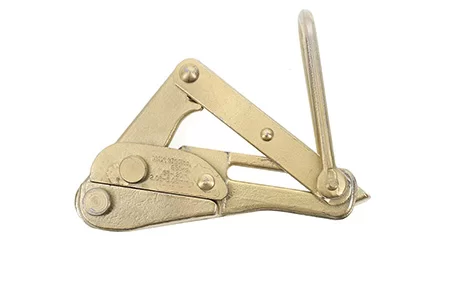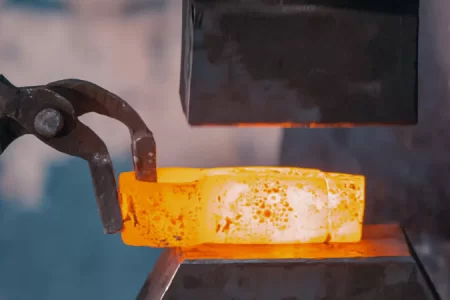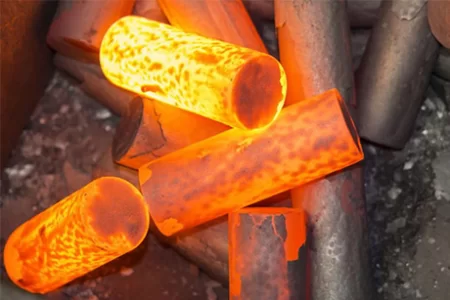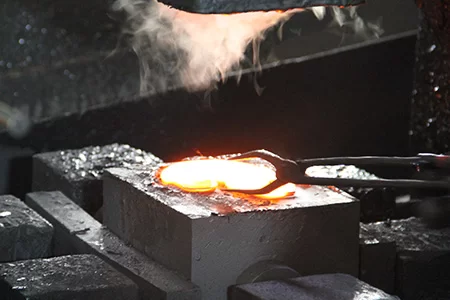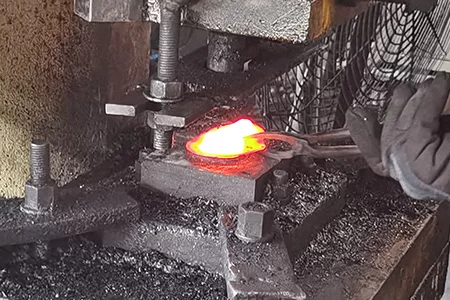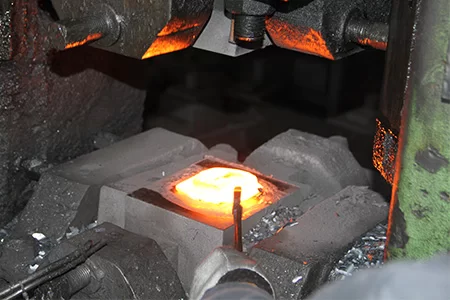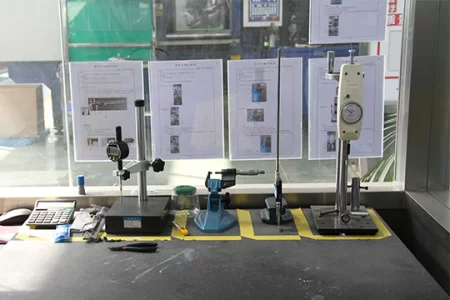By sharing knowledge, experience and views in the field of forging technology, we help you understand, learn and apply relevant technologies.

Hulk Metal Forging Technology
Share technical experience
-
Home>
-
Blog>
-
Technology>
What to look for when looking for a Forging Manufacturer?

In modern industrial manufacturing, Forging is the basis for the production of many key components. Whether it is the automotive, construction, or mining machinery industries, the forging process plays a vital role. Forging can not only improve the mechanical properties of the material but also greatly reduce the defects of the product and increase the service life. Therefore, choosing a high-quality forging manufacturer is essential to ensure product quality, improve production efficiency, and reduce costs.
However, choosing the right forging manufacturer is not an easy task. There are many forging suppliers in the market, and they differ in equipment, technology, production capacity, etc. As a buyer or engineer, how to choose the most suitable partner from many forging plants? This article will provide you with a detailed guide to help you make wise decisions when looking for a forging manufacturer.
Core criteria for evaluating forging plants
Production capacity and equipment
When choosing a forging plant, the first factor to consider is the production capacity of the manufacturer. Forging is a highly specialized process involving complex production equipment and technology. Therefore, it is necessary to understand the production capacity and equipment level of the manufacturer.
Selection of forging type
The types of forging mainly include free forging, die forging, warm forging, cold forging, etc. Different forging types are suitable for different materials and products. Free forging is suitable for producing parts with irregular shapes, while die forging is more suitable for mass production of parts with standardized sizes. Warm forging and cold forging are suitable for metal processing under different temperature conditions, respectively. Therefore, when choosing a forging plant, you should first understand whether it can provide the forging type that meets your needs.
Equipment level
A professional forging plant should be equipped with various types of equipment, such as forging hammers, presses, induction heating equipment, etc. Forging hammers and presses are the most core equipment in the forging production line, and their size, strength, and precision directly affect the quality of forged parts. In addition, whether the manufacturer is equipped with advanced heat treatment equipment, CNC processing equipment, etc. is also an important criterion for evaluating its production capacity.
Processing capacity
If your parts require complex subsequent processing, it is also crucial to ensure that the forging plant has sufficient processing capacity. A forging plant equipped with advanced CNC lathes, milling centers and other mechanical processing equipment can ensure that the parts produced can meet strict dimensional accuracy and surface quality requirements.
Material Supply and Quality Control
The selection of raw materials and quality control during the forging process directly determines the performance of the final product. Therefore, it is crucial to choose a forging plant with a stable supply of raw materials and a strict quality control system.
Material Selection
The forging plant should be able to handle a variety of metals, such as carbon steel, alloy steel, stainless steel, aluminum alloy, etc. Different materials have different processing difficulties and requirements. Choosing a manufacturer that can handle a variety of materials and has rich experience in various materials will help you improve the quality and production efficiency of your products.
Quality Control System
Whether the quality control system of the forging plant is complete is crucial to ensuring the quality of the final product. Generally speaking, the forging plant should have a comprehensive quality control process from raw material procurement to the final product. Common quality control methods include material composition testing, hardness testing, metallographic analysis, etc. Whether the manufacturer can provide a detailed quality inspection report can effectively verify its quality control level.
Certification and Quality Standards
International certification and industry standards are the key to measuring the quality control capabilities of a forging plant. Choosing a forging plant with relevant certification means that its product quality and management system meet international standards.
ISO Certification
ISO 9001 is a globally recognized quality management system certification that ensures that manufacturers strictly abide by quality management regulations during the production process. Other certifications such as IATF 16949 (applicable to the automotive industry) can further ensure the quality level of products.
Industry Standards
Forged products usually need to meet certain industry standards. For example, ASTM (American Society for Testing and Materials) standards, DIN (German Institute for Standardization) standards, GB (Chinese National Standards), etc. Qualified forging plants usually follow these standards in their production process to ensure the high quality of products.
Production process and technical level
The production process and technical level of the forging plant determine whether it can meet the needs of different customers. A forging plant with advanced technology can not only produce high-quality standard parts but also provide customized services according to customer needs.
One-stop forging solution
Some large forging plants can provide one-stop services from forging, heat treatment, and machining to surface treatment. This integrated production model can greatly improve production efficiency and reduce quality problems and delivery delays caused by factory transfer or outsourcing.
Technical level
The technical level usually reflects the manufacturer's grasp of the industry's technological trends. Advanced forging technology can improve production efficiency, optimize product performance, and reduce costs. An excellent forging plant should have the ability to independent research and development and technological innovation.
Customization capability
In many industries, customer needs are often highly customized. Choosing a forging plant that can provide customized services can ensure that it can produce according to your specific requirements.
OEM/ODM service
A mature forging plant can usually provide OEM (original equipment manufacturing) and ODM (original design manufacturing) services to help customers achieve personalized product needs. Through in-depth cooperation with customers, the forging plant can design molds that meet customer needs and ensure the quality and performance of the final product.
Mold design and solution optimization
If your needs involve complex shapes or special performance requirements, it is particularly important whether the forging plant has professional mold design and optimization capabilities. An excellent forging plant can not only provide standardized production processes but also optimize mold design and production processes according to customer needs.
Quality inspection capability
Quality inspection is the key to ensuring that forgings meet customer requirements. Choosing a forging plant with strong inspection capabilities can ensure that every product it produces is strictly inspected.
Dimension inspection
Forgings usually have high requirements for dimensional accuracy. Forging plants should be equipped with advanced dimensional inspection equipment, such as three-coordinate measuring machines, laser rangefinders, etc., to ensure that each product can accurately meet the design requirements.
Non-destructive testing
In addition to dimensional inspection, many forgings also require non-destructive testing (such as ultrasonic testing, magnetic particle testing, penetration testing, etc.) to ensure that there are no defects in their internal structure. A qualified forging plant usually uses a variety of non-destructive testing technologies to ensure the internal quality of the product.
Investigate the reliability of suppliers
Production experience and industry reputation
The production experience and industry reputation of a forging plant often reflect its technical level and customer satisfaction. Understanding the manufacturer's past experience, especially in your industry field, can help you make more informed decisions.
Manufacturer experience
The length of time a manufacturer has been established and whether it has accumulated rich industry experience is an important reference standard. Experienced forging plants can better cope with various challenges in the production process and ensure the timeliness and quality of delivery.
Industry reputation
The reputation of the manufacturer can be learned through channels such as online evaluation, peer recommendations, and customer feedback. Manufacturers that have long cooperated with well-known customers and received good reviews can usually guarantee their product quality and service level.
Delivery capability and supply chain management
Delivery capability and supply chain management directly affect the progress and cost of the project. A forging plant with efficient supply chain management can ensure timely delivery and avoid delays in customer production plans.
Delivery cycle
The length of the delivery cycle is an important criterion for measuring the production efficiency of a forging plant. Through communication with suppliers, understand whether their delivery cycle meets your project requirements to avoid additional costs caused by delivery delays.
Supply chain management
The supply chain management capabilities of the forging plant can ensure a stable supply of raw materials and a smooth production process. Good supply chain management can also reduce inventory costs and improve production flexibility.
The balance between price and quality
When choosing a forging plant, price is certainly an important factor, but quality should always be the primary consideration. Too low a price may mean reduced production quality or omission of necessary inspection steps. Therefore, the balance between reasonable price and high quality is an important basis for judging whether the manufacturer is suitable.
Price composition
The price of forged products is usually affected by many factors such as materials, processing technology, mold design, transportation, etc. When choosing a forging plant, you should understand the composition of its quotation and evaluate whether it is reasonable.
The balance between quality and price
Although price is an important criterion for selecting suppliers, quality should never be ignored. Too low a price may mean compromise in some aspects, while too high a price may lead to unnecessary expenses.
Customer service and communication efficiency
The level of customer service and communication efficiency directly affects your cooperation experience with the forging plant. Choosing a forging plant that can respond to your needs in a timely manner and has good communication skills will greatly improve cooperation efficiency and reduce misunderstandings and communication costs.
Sales and Technical Support
A good forging plant usually provides a professional sales and technical support team to help customers solve technical problems and optimize production plans. Make sure that you can have in-depth communication with the manufacturer's technical team before the project starts.
Communication Efficiency
Effective communication can help you grasp the progress of the project in real-time during the production process and ensure that possible problems are solved in a timely manner. Choosing a forging plant with efficient communication and quick response will help the smooth progress of the project.
Why choose HULK Metal?
HULK Metal has many years of forging experience and is committed to providing high-quality forgings to customers around the world. Our advantages include:
Professional forging experience
HULK Metal has advanced forging equipment and technology and can provide one-stop services from design to production to ensure that every product meets customer needs.
Strict quality control
We are ISO 9001 certified, TÜV/SGS testing to ensure product quality, and ensure that every detail is not overlooked.
Perfect customized service
We provide OEM/ODM services and can optimize and produce designs according to customer needs.
Efficient supply chain management
Our supply chain system is efficient and transparent, ensuring on-time delivery and reducing customer inventory pressure.
Global market recognition
HULK Metal has served customers in multiple industries and has gained wide recognition.
When choosing a forging manufacturer, in addition to considering factors such as its production capacity, quality standards, technical level, and delivery capabilities, you also need to verify its reliability in a variety of ways. By comprehensively considering the above factors, you will be able to choose a forging plant that suits your needs. Choosing HULK Metal will get high-quality and efficient forging services to ensure that your project goes smoothly.
Article Navigation
Article Navigation
Industries
Foundries
-

December.11, 2024
Analysis of the characteristics and main uses of wire grip for conductor
READ MORE
-

July.01, 2024
Difference between hot forging and cold forging
READ MORE
-

June.27, 2024
What are the advantages and disadvantages of the hot forging process?
READ MORE
-

February.28, 2025
Open Die Forging: Exploring the forging process and the key factors in selecting a OEM
READ MORE
-

February.24, 2025
Key Considerations for Closed Die Forging
READ MORE
-

February.18, 2025
Factors to consider when purchasing custom forgings
READ MORE
-

February.14, 2025
HULK Metal's hot forging quality control
READ MORE



